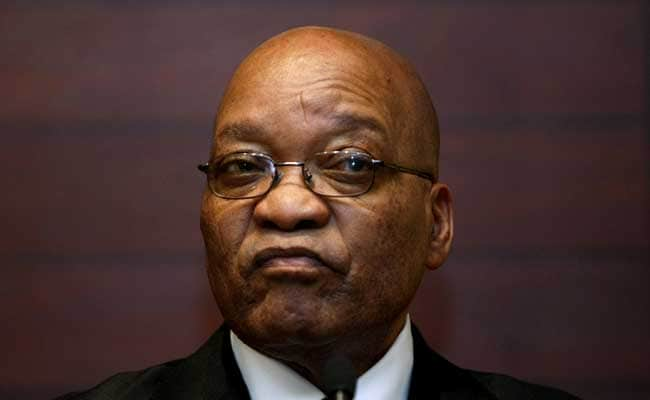Jacob Zuma reported to prison early Thursday after mounting a last-ditch legal bid and stoking defiance among radical supporters who had rallied at his rural home.

South Africa’s top court on June 29 slapped Jacob Zuma with a 15-month term
Johannesburg:
Jacob Zuma on Thursday began a 15-month sentence for contempt of court, becoming South Africa’s first post-apartheid president to be jailed after a drama that campaigners said ended in a victory for rule of law.
Zuma, 79, reported to prison early Thursday after mounting a last-ditch legal bid and stoking defiance among radical supporters who had rallied at his rural home.
His battle transfixed the country, placing a spotlight on the issue of impunity and tensions within the ruling African National Congress (ANC).
South Africa’s top court on June 29 slapped Zuma with a 15-month term for refusing to appear before a probe into the corruption that entangled his nine years in power.
As police warned he faced arrest from midnight Wednesday, Zuma handed himself in to a jail in the rural town of Estcourt in his home province of KwaZulu-Natal.
Many South Africans hailed his incarceration as a watershed moment for the young democracy.
Former corruption buster Thuli Madonsela called it “a giant development to the country’s rule of law journey.”
“But at a human level, it’s a sad moment because it’s something that could have been avoided. We didn’t have to have a 79-year-old former head of state and former liberation struggle stalwart go to jail just because just he doesn’t want to be held to account,” she told AFP.
The opposition Democratic Alliance said, “the law cannot be mocked and challenged with impunity. If the leader can go to prison, then so can anyone.”
But, it cautioned, the contempt sentence did not address the wider corruption, fraud and racketeering that proliferated under Zuma.
The Nelson Mandela Foundation struck a similar note.
“His legal strategy has been one of obfuscation and delay, ultimately in an attempt to render our judicial processes unintelligible,” it said.
“It is tempting to regard Mr Zuma’s arrest as the end of the road” rather than “merely another phase… in a long and fraught journey,” the foundation warned.
– Flawed president –
Born into poverty, Zuma started out as an uneducated herdboy who joined the ANC, becoming its intelligence chief in the anti-apartheid struggle.
His charisma and courage, including 10 years in jail on notorious Robben Island, placed him alongside Nelson Mandela, Oliver Tambo and other liberation heroes.
In 2009, he became democratic South Africa’s third president, but it proved to be a tenure darkened by divisions and the stench of corruption.
In 2018, Zuma was forced out by the ANC and replaced by Cyril Ramaphosa, a former trade union leader who became a tycoon after apartheid was finally dismantled 30 years ago.
Investigators say that under Zuma, billions of dollars in state assets were siphoned off by cronies.
But their efforts to get Zuma to testify hit a wall. Critics labelled him the “Teflon president” for his perceived ability to sidestep justice.
– Defiance –
Zuma had been given a deadline of Sunday night for turning himself in. Failing his surrender, police were given three days — until midnight Wednesday — to arrest him.
He filed a last-ditch petition to overturn the arrest and pleaded with the Constitutional Court to rescind its sentence. The court will hear the plea on Monday.
Bucking the first deadline, Zuma declared at the weekend that he was prepared to go prison, even though “sending me to jail during the height of a pandemic, at my age, is the same as sentencing me to death.”
“I am not scared of going to jail for my beliefs,” he said. “I have already spent more than 10 years in Robben Island, under very difficult and cruel conditions.”
As the Wednesday deadline loomed, police said they were prepared to carry out the arrest.
Minutes before midnight, Zuma left his house in a convoy of cars speeding through dark rural roads “to comply with the incarceration order.”
But he may be back home before Christmas as he will be eligible for parole in just under four months.
After visiting the prison, Justice Minister Ronald Lamola said Zuma is in “very good spirits and has taken his breakfast, …his medication.”
“He is being taken care of, his jolly good self, laughing,” Lamola said.
Among the public, some South Africans expressed sympathy for Zuma.
“I’m sure he is quite stressed right now,” said Sharon Mayisela, a 40-year-old waitress.
“Maybe they can just do a house arrest,” she suggested.
Posting a night-time picture of the correctional services facility where Zuma is jailed, his foundation tweeted, “this is where President Zuma, a 79-year-old grandfather is imprisoned without trial.
“The country is sliding back to apartheid days.”
ANC stress
The drama has fuelled tensions with the ANC, where Zuma supporters have clamoured for the defence of their hero while others have demanded the law be allowed to run its course.
“Be strong now because things will get better,” Ace Magashule, a Zuma stalwart, and suspended ANC secretary general over fraud charges, said in a tweet.
“It might be stormy now, but it can’t rain forever. We soldier on.”
In a statement, the party said “without doubt this is a difficult period in the movement” but appealed for members “to remain calm and respect the decision” taken by Zuma to abide by the court rulings.
He also faces 16 charges of fraud, graft and racketeering in an arms procurement scandal dating to 1999, when he was vice president.
(Except for the headline, this story has not been edited by our staff and is published from a syndicated feed.)
